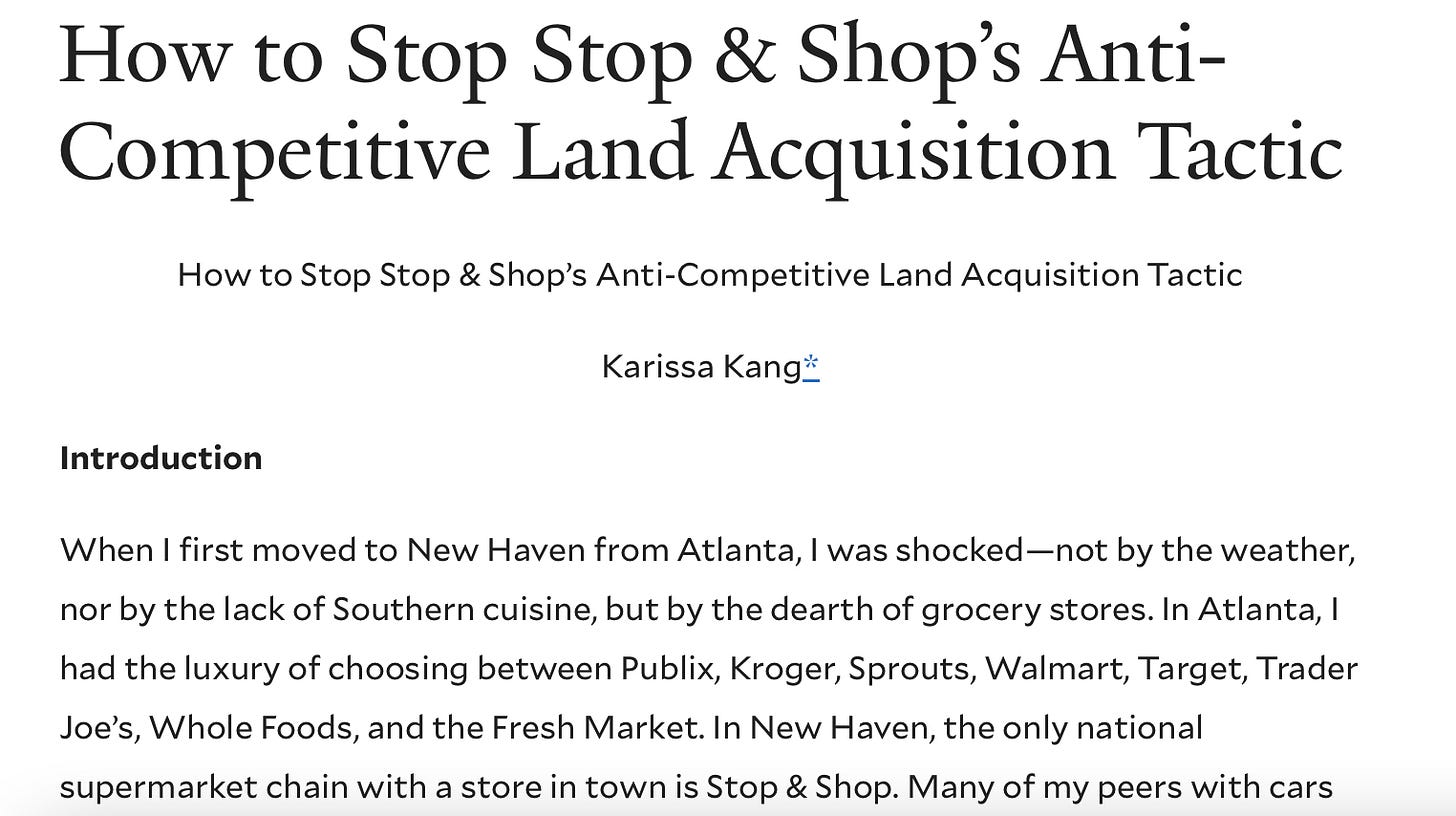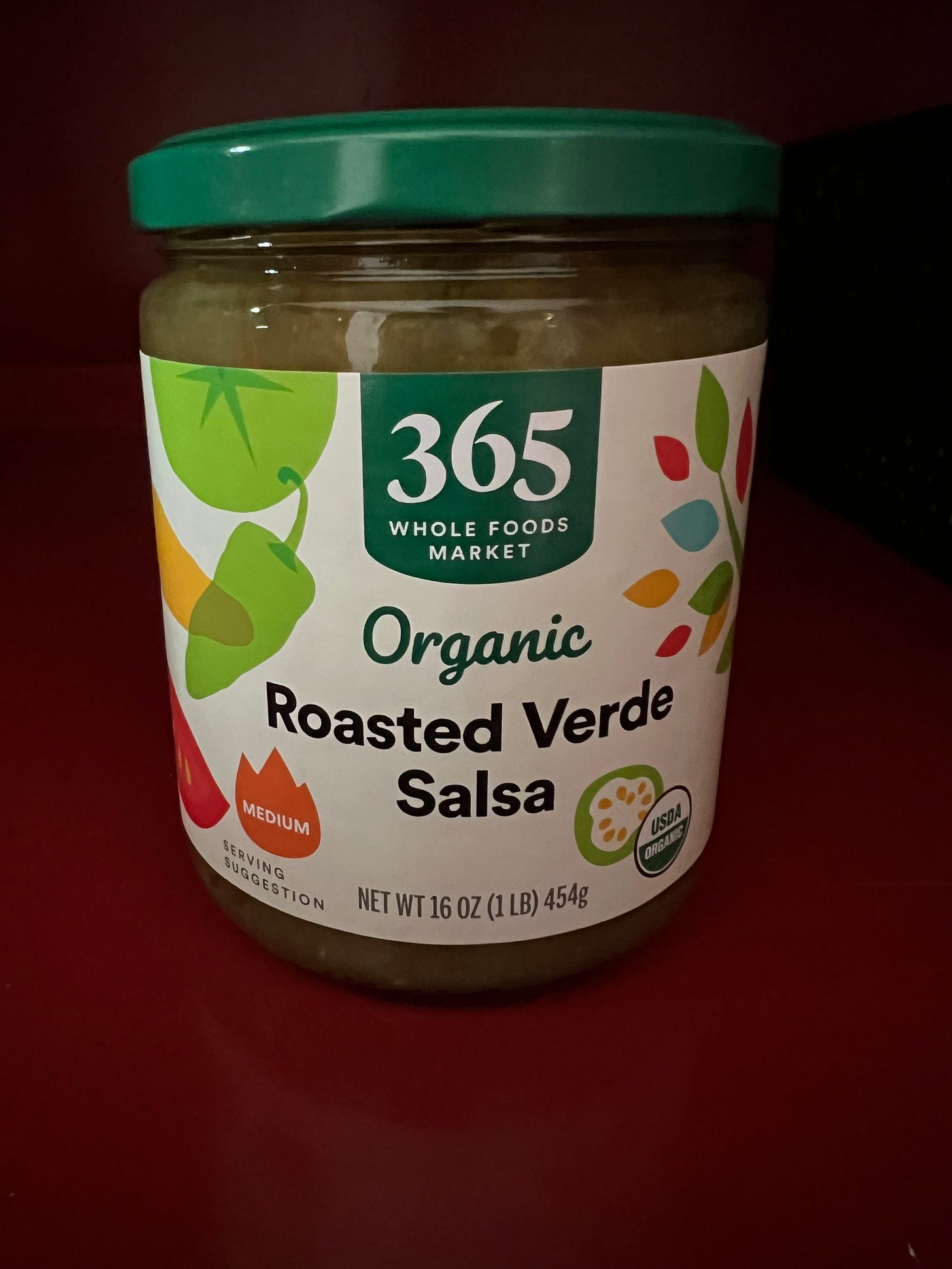Grocery Update Volume 1, #4
Stop & Shop Closures and HEB's Benevolent Monopoly.
Discontents: 1. Stop & Shop Closures Could Mean More Food Apartheid. 2. Is HEB A Justifiable Monopoly? 3. Product Review: 365 Organic Roasted Verde Salsa. 4. Tunes.
Stop & Shop Closures Could Mean Food Apartheid: Ahold-Delhaize, the Dutch-Belgian conglomerate that is the 6th largest U.S. grocery chain, has announced that it will be closing a number of Stop & Shop stores across the Northeast. Stop & Shop is one of the largest grocers in the New York, Boston and coastal New England areas, with nearly 400 stores.
The company stated that they are focusing on closing underperforming stores. The announcement comes just a few years into new union contracts and after investing millions in store upgrades and unveiling a new merchandising strategy to serve their increasingly diverse communities. Stop & Shop did over $58 billion in sales in 2023, but it has been hampered by lower unit volumes while sales growth has been stagnant. Most likely customers grew weary of price over volume retail strategies that drove profits at the expense of product turns. Stop & Shop competes with heavyweights such as Walmart, Shoprite, Market Basket, Whole Foods, Trader Joe’s, Aldi, Costco and many other large chains. The chain is also focused on increasing private label penetration to over 45% of sales, a sign that it is being pressured on price from mass merchants and discounters.
While such a hard-nosed, prudent business decision may make fiscal sense, grocery chains carry responsibilities other than to there shareholders. They are employers, community centers and essential service providers as well as the main source of sustenance for customers. Thousands of clerks, cashiers and supply chain workers will be impacted. Many will be laid off or transferred to stores further from home. And the communities will bear the biggest brunt. While many areas have other grocery options, in cities such as New Haven or in parts of Massachusetts, Stop & Shop is the main grocery destination for miles around.
The company is notorious for negotiating restrictive lease covenants for dozens of their sites. These contracts won’t allow another grocery store to be built on the site of a closed location, sometimes for decades. Such covenants create food apartheid. Food apartheid is a concept coined by Bronx farmer and organizer Karen Washington that describes a food system divided into haves and have-nots, usually by race and ethnicity. Grocery chains make such a situation worse through inequitable business practices, like low wages, poor food quality and store siting decisions. Through this lease, it’s easy to assume that the “underperforming” stores will mostly be located in working class communities that don’t have a lot of disposable income to spend on high margin organic and specialty items. But we would love to be wrong.
The grocery industry has lost thousands of stores since the 1990’s as big chains have gobbled up or knocked out independent competitors. But when these big chains put their business fundamentals before the needs of workers and communities, they prove once again that a consolidated industry can never work in the best interest of the people they should be serving.
HEB: A Justifiable Monopoly? HEB is probably the most beloved grocery monopoly in the country. Sure, there are other grocery monopolies, like Walmart’s dominance in hundreds of metro areas across the heartland, the Kroger/Albertson’s duopoly on the West Coast, or Publix taking no prisoners in Florida, but the distinction is that Texans really LOVE HEB. They are the top ranked grocery chain in the U.S. again and again and again.
A grocery brand with a heart as big, bold, boisterous and diverse as the state it calls home, HEB owns 50+% market share in Austin, 47% in San Antonio and over 20% in Houston. These are 3 of the 11 biggest cities in the U.S. They have a store at nearly every exit on major thoroughfare. HEB is owned by the Butt Family and is one of the largest privately-held grocery chains in the U.S. at $38 billion in sales, more or less twice that of Whole Foods or Wakefern (Shoprite).
HEB is probably the only grocer that scares off Walmart, and not just because of their assortment and their great prices. HEB has a lock on the hearts, minds and wallets of their communities. They are a major sponsor of community charities and civic events all over Texas. The chain adeptly embraces all of its community members and shows little signs of the social and cultural conservatism that Texan Republican political leadership, or the Butt family in particular, is known for. They are also a non-union shop. HEB does not have the best pay rates, but employees stay with them for decades. They are old fashioned in the sense that a hard-working stock clerk or cashier can actually build a career there, which is hardly the case at competitors such as Whole Foods and Walmart, where turnover is high and morale is lower.
Probably the best analogue for such a family-owned behemoth with great customer satisfaction and employee loyalty is Wegman’s. The parallels with Wegman’s are obvious: big stores with broad assortments that serve everyone and also act as community magnets, especially during inclement weather (Wegman’s in the frigid northeast winter, HEB in that brutal Texas summer). HEB has a modest employee ownership stake as well. They rolled it out around the same time Whole Foods was laying off thousands of employees, as if to tip their hat that they could take better care of their people. So once again, not a union shop, but employee ownership shares are a nice win for staff.
HEB markets BIG claims around local and regional sourcing: just count the Texas iconography around any given HEB. Yes, “local” marketing is mostly bullshit, but there is plenty of authentic Texas sourcing around the store. Each department is overdone with sale pricing and value signage, so you never forget that HEB owns Walmart in this market, that HEB owns Texas and in the most benevolent way possible, HEB owns you as their customer.
HEB merchandising is clean but more or less standard for a mass merchant. Wide facings of store brands at eye level, for all purchase occasions. Generous placement of national brands and more than a few authentically local, diverse owned brands. HEB does not charge slotting fees and they are very straightforward in their dealings with suppliers. They are very demanding but not unreasonable, and they communicate professionally and in a timely manner. For brands used to getting gaslit, lied to, cheated and stolen from by their retail and wholesale customers, such tough love is relief.
The HEB agricultural heartland of East Texas and the Rio Grande Valley produces “local” Texas staples and commodities at industrial and factory farmed scale. Hundreds of farms contribute to the bounty, the vast majority of them chemically intensive and fossil fuel dependent, producing food for the 25 million residents within a 10 hour drive of production. The produce and dairy departments claim dozens of locally sourced items, probably the most to find at scale outside of California. Brisket, what brisket? Nothing says Texas like a 2 pound bag of Texas grown kale. HEB keeps milk prices low by concentrating production in Texas factory farms and lining up distribution and retail drops along efficient trucking routes. HEB also gives plenty of room to organic brands and has its own segregated healthy living section. No, it is not Natural Grocers, but it is more than adequate for most shoppers.
HEB also has a desk of various administrative and clerical needs, like picking up your auto registration or getting photo copies made. A neighborhood grocery store doing essential public services kindly and efficiently is neoliberalism in a nutshell. It’s easy to forget HEB is not a publicly-owned entity, especially when they show up and save the day after each Texas weather disaster. With Texas on the leading edge of climate change impacts and a state government that is happy to outsource public services, HEB will have an invaluable role to play at scale.
HEB staff are probably what ensures loyalty from most shoppers. Despite the huge stores, boisterous signage and cavernous layouts, there is a friendly, chill vibe from cashiers and clerks. They don’t have an easy job but rarely seem to hate it. Staff members make eye contact, are polite and helpful, and actually seem to want you keep shopping there. It is a nice change from Walmart self-checkout hell or the too-cool for school vibe of certain upscale local competitors.
Is HEB perfect? Far from it. They also do food apartheid. The product assortment and store quality in East Austin is not on par with south and west side stores. They have been known to close stores when better locations open up, leaving neighborhoods in the lurch with restrictive lease covenants. Once again, they are not union and why that matters- well, more on that later. And HEB is impossible to compete with. They have a lock on the market and in the long run, Texans should be worried that they are putting so many groceries in the Butt’s basket. Ownership, even in the Butt dynasty, could change hands. Economics, especially fossil fuel or high-tech-related, could hurt Texas’ population and job growth, hurting store sales growth and store openings. Retail economics in growth mode is very different from stagnation, just look at Stop & Shop. Plus, the Texas water supply is dicey and Texas is ground zero for climate-related impacts, between catastrophic wildfires, hurricanes, tornados, fist-sized hailstones and more frequent draughts.
So yes, HEB is a monopoly in central Texas. Monopolies are bad, for so many reasons. But at least this monopoly is HEB.
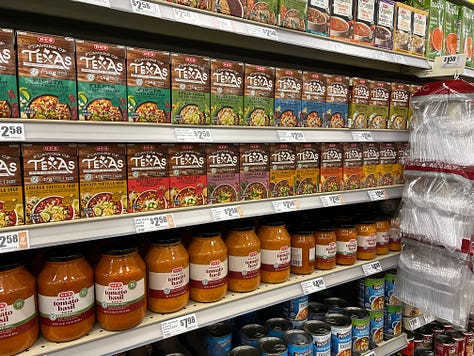
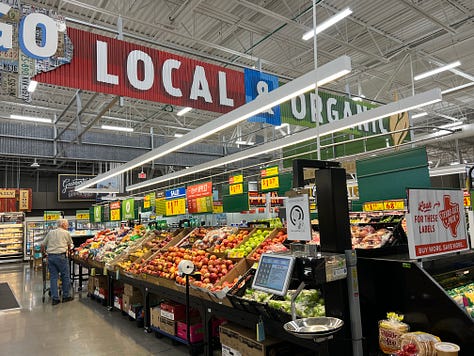
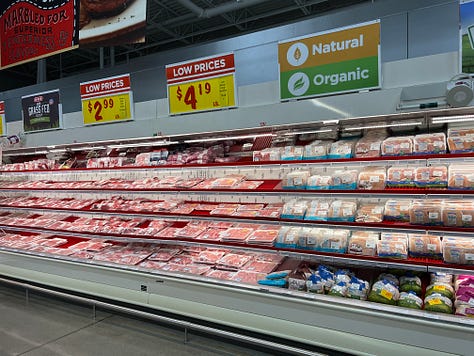
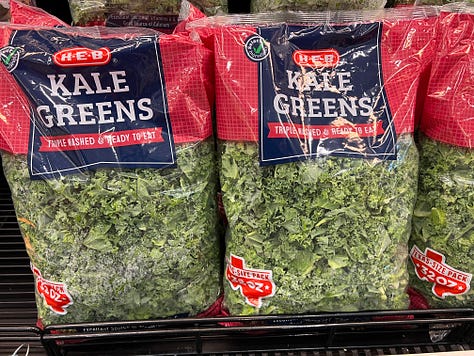
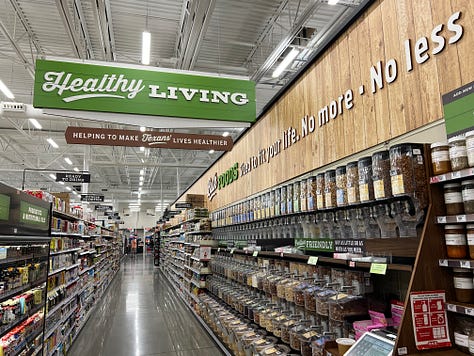
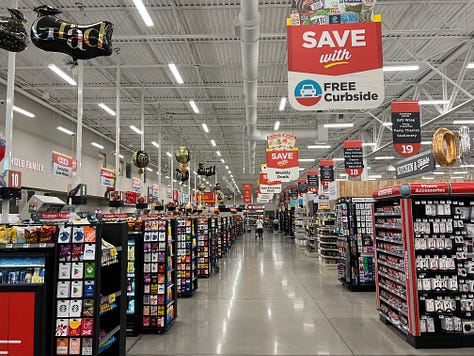
Product Review: 365 Organic Roasted Verde Salsa. Ok, so I am biased here. I helped develop and merchandise this product when I was at Whole Foods. But I give the store brands team credit for maintaining a superb and reasonably priced product. Taste and quality wise, it stacks up to most national brands and quite a few local Texas salsas. It definitely keep pace with most other private label salsas and has a cleaner ingredient deck. I don’t know of too many other organic verde salsas that have national distribution. Tomatillos give it that special zing and there is just enough heat to get noticed but not overwhelmed. Did I mention that is organic? I am also weird in that I like mixing hot sauce, plus red and green salsas on tacos, rice and beans or tortilla chips. Usually some verde with a little roasted chipotle salsa and some habanero sauce and I am a happy camper. Highly recommended.
4. Tunes: It is getting hot in Texas. That Texas sun is inexorable, it feels like the hot side of Mercury, especially when you work outside. But somehow Houston’s Khruangbin teaming up with soul legend Leon Bridges make it all so chill. And that logo, like driving I-10 westbound somewhere between Fort Stockton and Van Horn (a mandatory road trip if you have time). Easily one of my favorite contemporary album covers.
Peace.



